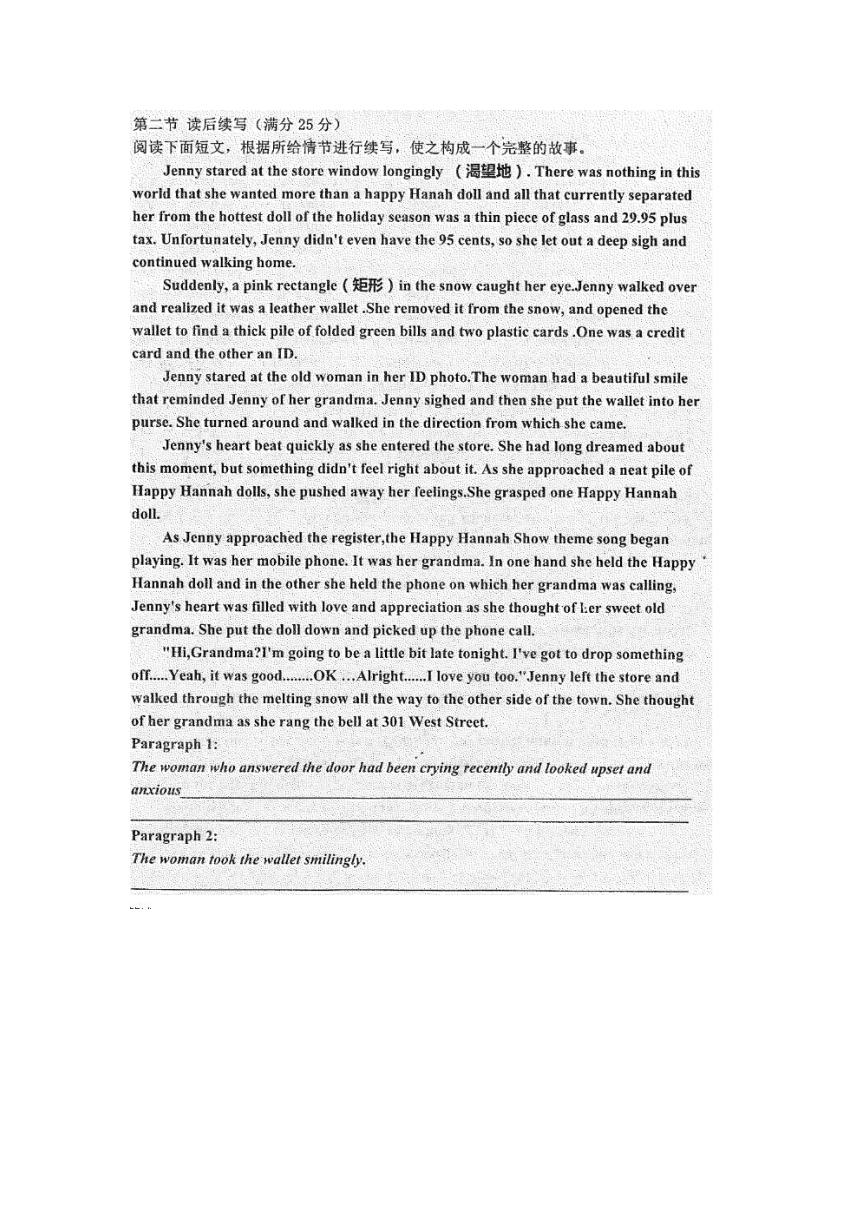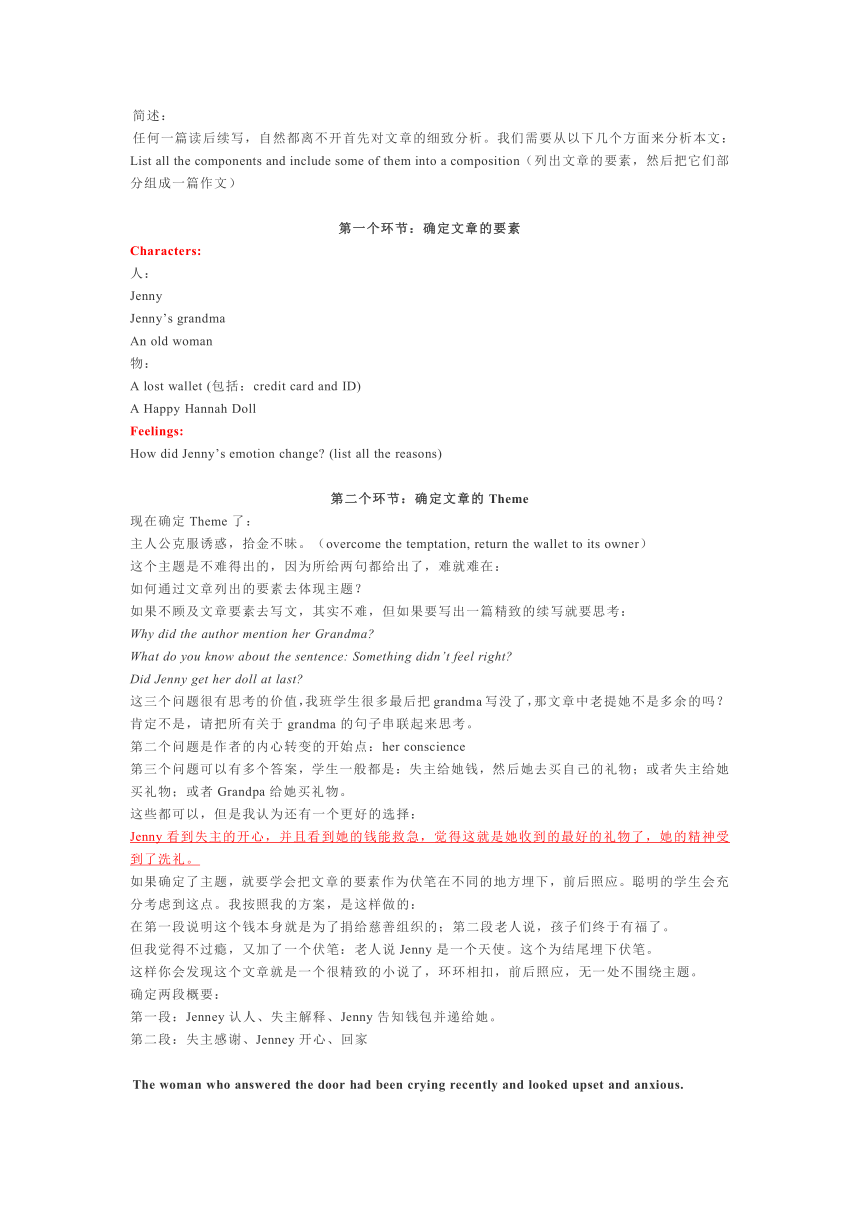高中英语读后续写:续写就是彼此的成全(作文:良知和礼物)
文档属性
| 名称 | 高中英语读后续写:续写就是彼此的成全(作文:良知和礼物) |  | |
| 格式 | zip | ||
| 文件大小 | 843.0KB | ||
| 资源类型 | 教案 | ||
| 版本资源 | 通用版 | ||
| 科目 | 英语 | ||
| 更新时间 | 2020-11-26 16:23:24 | ||
图片预览


文档简介
简述:
任何一篇读后续写,自然都离不开首先对文章的细致分析。我们需要从以下几个方面来分析本文:
List
all
the
components
and
include
some
of
them
into
a
composition(列出文章的要素,然后把它们部分组成一篇作文)
第一个环节:确定文章的要素
Characters:
人:
Jenny
Jenny’s
grandma
An
old
woman
物:
A
lost
wallet
(包括:credit
card
and
ID)
A
Happy
Hannah
Doll
Feelings:
How
did
Jenny’s
emotion
change?
(list
all
the
reasons)
第二个环节:确定文章的Theme
现在确定Theme了:
主人公克服诱惑,拾金不昧。(overcome
the
temptation,
return
the
wallet
to
its
owner)
这个主题是不难得出的,因为所给两句都给出了,难就难在:
如何通过文章列出的要素去体现主题?
如果不顾及文章要素去写文,其实不难,但如果要写出一篇精致的续写就要思考:
Why
did
the
author
mention
her
Grandma?
What
do
you
know
about
the
sentence:
Something
didn’t
feel
right?
Did
Jenny
get
her
doll
at
last?
这三个问题很有思考的价值,我班学生很多最后把grandma写没了,那文章中老提她不是多余的吗?肯定不是,请把所有关于grandma的句子串联起来思考。
第二个问题是作者的内心转变的开始点:her
conscience
第三个问题可以有多个答案,学生一般都是:失主给她钱,然后她去买自己的礼物;或者失主给她买礼物;或者Grandpa给她买礼物。
这些都可以,但是我认为还有一个更好的选择:
Jenny看到失主的开心,并且看到她的钱能救急,觉得这就是她收到的最好的礼物了,她的精神受到了洗礼。
如果确定了主题,就要学会把文章的要素作为伏笔在不同的地方埋下,前后照应。聪明的学生会充分考虑到这点。我按照我的方案,是这样做的:
在第一段说明这个钱本身就是为了捐给慈善组织的;第二段老人说,孩子们终于有福了。
但我觉得不过瘾,又加了一个伏笔:老人说Jenny是一个天使。这个为结尾埋下伏笔。
这样你会发现这个文章就是一个很精致的小说了,环环相扣,前后照应,无一处不围绕主题。
确定两段概要:
第一段:Jenney认人、失主解释、Jenny告知钱包并递给她。
第二段:失主感谢、Jenney开心、回家
?
The
woman
who
answered
the
door
had
been
crying
recently
and
looked
upset
and
anxious.
“Are
you
Mrs.
Green?”
Jenny
asked
politely,
recognizing
her
from
the
ID
card
instantly.
(这一句只有极个别同学能写好,很多都是写Jenny问:What’s
the
matter
with
you?
May
I
help
you??作为一个陌生人,敲门后第一句应该是确定对方是不是她要找的人,直入主题容易推进故事发展。)
Mrs.
Green
nodded
in
confusion
and
let
her
come
in.
(切换到Mrs.
Green,根据生活常识,应该是困惑。本段由于情节非常简单,而且基本是对话,就要学会把对话转换掉。)
“Madam,
did
you
lose
something?”
Jenny
continued
and
asked
some
necessary
questions.
(再次切换,符合Action-Response原则)
“I
lost
my
wallet
with
the
money
to
buy
gifts
for
some
poor
children.”
The
old
lady
blurted
out
at
last,
her
eyes
rounding
in
surprise
and
sparkling
with
hope.
(此时不露声色地把老人的钱的用途说出来
Overcome
with
guilt,
Jenny
felt
her
face
burning
and
handed
the
wallet
to
her.
Thank
God,
she
would
have
disappointed
those
kids.
(这一段的心里描写很有必要的,和前文的愧疚照应,同时说明了Jenney是多么深刻认识到自己的以前的做法的不对。最后虚拟语气也是用的恰当,实际上虚拟语气在记叙文中很常见,一般刻画人物的后悔惭愧或庆幸)
The
woman
took
the
wallet
smilingly.
She
held
it
to
her
chest
tightly
and
then
hugged
Jenny,
tears
streaming
down
her
face.
(承接上文,同时刻画她的心理)
“You
are
the
real
angel.
No
one
knows
what
the
wallet
means
to
the
children.”
She
sobbed
in
gratitude.
(写失主的感激的同时,不忘记埋下伏笔)
Jenny’s
soft
heart
was
touched
because
her
grandma
often
called
her
angel.
(这一句也是照应文章中说的,她想起了grandma的笑容)
That
night,
she
darted
across
the
street,
the
creaking
of
snow
echoing
in
the
air.
(环境的描写衬托她的开心,画面感十足:月夜下,一个女生飞奔在回家的路上,脚下传来吱吱呀呀声。有没有必要写老人邀请她吃东西等等?要看主题了。有时能否学会省略是高手和初学者的分水岭。初学者总想面面俱到,生怕漏掉一个,导致文章婆婆妈妈的。记叙文有个重要技能就是:停顿和跳跃)
How
eager
she
was
to
tell
her
grandma
that
today
she
got
a
present
more
meaningful
than
Hannah
doll—She
was
a
real
angel!
(小女儿此时只想赶快告诉grandma:我是真正的天使啦!此句把她的可爱、纯洁刻画得惟妙惟肖。笔者写这类文章比较容易动感情,因为我也有一个可爱的女儿,每次写小女孩,我总会情不自禁想起女儿的一言一行,每一句看似是虚拟,但其实都是我的生活的再现。)
?
完整的:
The
woman
who
answered
the
door
had
been
crying
recently
and
looked
upset
and
anxious.“Are
you
Mrs.
Green?”
Jenny
asked
politely,
recognizing
her
from
the
ID
card
instantly.
Mrs.
Green
nodded
in
confusion
and
let
her
come
in.
“Madam,
did
you
lose
something?”
Jenny
continued
and
asked
some
necessary
questions.
“I
lost
my
wallet
with
the
money
to
buy
gifts
for
some
poor
children.”
The
old
lady
blurted
out
at
last,
her
eyes
rounding
in
surprise
and
sparkling
with
hope.
Overcome
with
guilt,
Jenny
felt
her
face
burning
and
handed
the
wallet
to
her.
Thank
God,
she
would
have
disappointed
those
kids.
The
woman
took
the
wallet
smilingly.
She
held
it
to
her
chest
tightly
and
then
hugged
Jenny,
tears
streaming
down
her
face.
“You
are
the
real
angel.
No
one
knows
what
the
wallet
means
to
the
children.”
She
sobbed
in
gratitude.
Jenny’s
soft
heart
was
touched
because
her
grandma
often
called
her
angel.
That
night,
she
darted
across
the
street,
the
creaking
of
snow
echoing
in
the
air.
How
eager
she
was
to
tell
her
grandma
that
today
she
got
a
present
more
meaningful
than
Hannah
doll—She
was
a
real
angel!
(172
words)
任何一篇读后续写,自然都离不开首先对文章的细致分析。我们需要从以下几个方面来分析本文:
List
all
the
components
and
include
some
of
them
into
a
composition(列出文章的要素,然后把它们部分组成一篇作文)
第一个环节:确定文章的要素
Characters:
人:
Jenny
Jenny’s
grandma
An
old
woman
物:
A
lost
wallet
(包括:credit
card
and
ID)
A
Happy
Hannah
Doll
Feelings:
How
did
Jenny’s
emotion
change?
(list
all
the
reasons)
第二个环节:确定文章的Theme
现在确定Theme了:
主人公克服诱惑,拾金不昧。(overcome
the
temptation,
return
the
wallet
to
its
owner)
这个主题是不难得出的,因为所给两句都给出了,难就难在:
如何通过文章列出的要素去体现主题?
如果不顾及文章要素去写文,其实不难,但如果要写出一篇精致的续写就要思考:
Why
did
the
author
mention
her
Grandma?
What
do
you
know
about
the
sentence:
Something
didn’t
feel
right?
Did
Jenny
get
her
doll
at
last?
这三个问题很有思考的价值,我班学生很多最后把grandma写没了,那文章中老提她不是多余的吗?肯定不是,请把所有关于grandma的句子串联起来思考。
第二个问题是作者的内心转变的开始点:her
conscience
第三个问题可以有多个答案,学生一般都是:失主给她钱,然后她去买自己的礼物;或者失主给她买礼物;或者Grandpa给她买礼物。
这些都可以,但是我认为还有一个更好的选择:
Jenny看到失主的开心,并且看到她的钱能救急,觉得这就是她收到的最好的礼物了,她的精神受到了洗礼。
如果确定了主题,就要学会把文章的要素作为伏笔在不同的地方埋下,前后照应。聪明的学生会充分考虑到这点。我按照我的方案,是这样做的:
在第一段说明这个钱本身就是为了捐给慈善组织的;第二段老人说,孩子们终于有福了。
但我觉得不过瘾,又加了一个伏笔:老人说Jenny是一个天使。这个为结尾埋下伏笔。
这样你会发现这个文章就是一个很精致的小说了,环环相扣,前后照应,无一处不围绕主题。
确定两段概要:
第一段:Jenney认人、失主解释、Jenny告知钱包并递给她。
第二段:失主感谢、Jenney开心、回家
?
The
woman
who
answered
the
door
had
been
crying
recently
and
looked
upset
and
anxious.
“Are
you
Mrs.
Green?”
Jenny
asked
politely,
recognizing
her
from
the
ID
card
instantly.
(这一句只有极个别同学能写好,很多都是写Jenny问:What’s
the
matter
with
you?
May
I
help
you??作为一个陌生人,敲门后第一句应该是确定对方是不是她要找的人,直入主题容易推进故事发展。)
Mrs.
Green
nodded
in
confusion
and
let
her
come
in.
(切换到Mrs.
Green,根据生活常识,应该是困惑。本段由于情节非常简单,而且基本是对话,就要学会把对话转换掉。)
“Madam,
did
you
lose
something?”
Jenny
continued
and
asked
some
necessary
questions.
(再次切换,符合Action-Response原则)
“I
lost
my
wallet
with
the
money
to
buy
gifts
for
some
poor
children.”
The
old
lady
blurted
out
at
last,
her
eyes
rounding
in
surprise
and
sparkling
with
hope.
(此时不露声色地把老人的钱的用途说出来
Overcome
with
guilt,
Jenny
felt
her
face
burning
and
handed
the
wallet
to
her.
Thank
God,
she
would
have
disappointed
those
kids.
(这一段的心里描写很有必要的,和前文的愧疚照应,同时说明了Jenney是多么深刻认识到自己的以前的做法的不对。最后虚拟语气也是用的恰当,实际上虚拟语气在记叙文中很常见,一般刻画人物的后悔惭愧或庆幸)
The
woman
took
the
wallet
smilingly.
She
held
it
to
her
chest
tightly
and
then
hugged
Jenny,
tears
streaming
down
her
face.
(承接上文,同时刻画她的心理)
“You
are
the
real
angel.
No
one
knows
what
the
wallet
means
to
the
children.”
She
sobbed
in
gratitude.
(写失主的感激的同时,不忘记埋下伏笔)
Jenny’s
soft
heart
was
touched
because
her
grandma
often
called
her
angel.
(这一句也是照应文章中说的,她想起了grandma的笑容)
That
night,
she
darted
across
the
street,
the
creaking
of
snow
echoing
in
the
air.
(环境的描写衬托她的开心,画面感十足:月夜下,一个女生飞奔在回家的路上,脚下传来吱吱呀呀声。有没有必要写老人邀请她吃东西等等?要看主题了。有时能否学会省略是高手和初学者的分水岭。初学者总想面面俱到,生怕漏掉一个,导致文章婆婆妈妈的。记叙文有个重要技能就是:停顿和跳跃)
How
eager
she
was
to
tell
her
grandma
that
today
she
got
a
present
more
meaningful
than
Hannah
doll—She
was
a
real
angel!
(小女儿此时只想赶快告诉grandma:我是真正的天使啦!此句把她的可爱、纯洁刻画得惟妙惟肖。笔者写这类文章比较容易动感情,因为我也有一个可爱的女儿,每次写小女孩,我总会情不自禁想起女儿的一言一行,每一句看似是虚拟,但其实都是我的生活的再现。)
?
完整的:
The
woman
who
answered
the
door
had
been
crying
recently
and
looked
upset
and
anxious.“Are
you
Mrs.
Green?”
Jenny
asked
politely,
recognizing
her
from
the
ID
card
instantly.
Mrs.
Green
nodded
in
confusion
and
let
her
come
in.
“Madam,
did
you
lose
something?”
Jenny
continued
and
asked
some
necessary
questions.
“I
lost
my
wallet
with
the
money
to
buy
gifts
for
some
poor
children.”
The
old
lady
blurted
out
at
last,
her
eyes
rounding
in
surprise
and
sparkling
with
hope.
Overcome
with
guilt,
Jenny
felt
her
face
burning
and
handed
the
wallet
to
her.
Thank
God,
she
would
have
disappointed
those
kids.
The
woman
took
the
wallet
smilingly.
She
held
it
to
her
chest
tightly
and
then
hugged
Jenny,
tears
streaming
down
her
face.
“You
are
the
real
angel.
No
one
knows
what
the
wallet
means
to
the
children.”
She
sobbed
in
gratitude.
Jenny’s
soft
heart
was
touched
because
her
grandma
often
called
her
angel.
That
night,
she
darted
across
the
street,
the
creaking
of
snow
echoing
in
the
air.
How
eager
she
was
to
tell
her
grandma
that
today
she
got
a
present
more
meaningful
than
Hannah
doll—She
was
a
real
angel!
(172
words)
